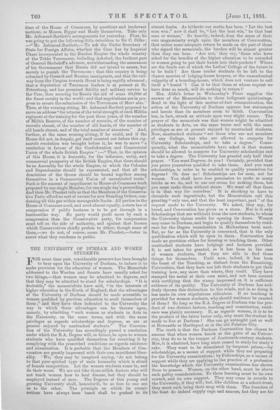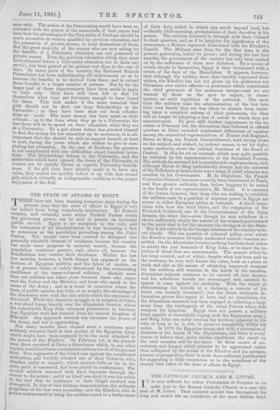THE UNIVERSITY OF DURHAM AND WOMEN STUDENTS.
FOR some time past, considerable pressure has been brought to bear upon the University of Durham, to induce it to make provision for the education of women. The Memorials addressed to the Warden and Senate have usually asked for two things,—that women may be admitted to degrees, and that they may be admitted to stand for scholarships. "It is desirable," the memorialists have said, "in the interests of higher education in the North of England, that the advantages of the University of Durham should be made accessible to women qualified by previous education to avail themselves of them ;" and they have then indicated to the University the way in which these advantages can be thrown open, namely, by admitting " such women as students in Arts in the University, on the same terms, and with the same privileges as regards scholarships and degrees, as are at present enjoyed by unattached students." The Convoca- tion of the University has accordingly passed a resolution under which the B.A. Degree will, in future, bo open to women students who have qualified themselves for receiving it by complying with the prescribed conditions as regards residence and examination. It is probable that the Members of Con- vocation are greatly impressed with their own munificent liber- ality. 'We,' they may be imagined saying, do not belong to that poor-spirited type of male humanity which is afraid of female competition. Let the women students come in, and do their worst. We are not like those selfish doctors who will not teach women how to heal disease, lest they should be employed instead of men, The Degrees of this young and growing University shall, henceforth, be as free to one sex as to the other. The principle on which its exami- nations have always been based shall be pushed. to its
utmost limits. As hitherto our motto has been, "Lot the best man win ;" now it shall be, "Let the best win," be that best man or woman.' So heavily, indeed, does the sense of their own magnanimity weigh upon the members of Convocation, that unless some adequate return be made on the part of those who signed the memorials, the burden will be almost greater than they can bear. ' Aro not,' they cry, those who have asked for the benefits of the higher education to be extended to women going to put their hands into their pockets ? Where are the funds out of which the Ladies' College of the future is to be built ? Are these tender students to be left to the chance mercies of lodging-house keepers, or the unacademical vulgarity of a boarding-house, which does not venture to call itself a " hostel "I Can it be that those at whose request we have done so much, will do nothing in return ?'
Mrs. Aldis's letter in Wednesday's Times supplies the answer of the Memorialists to these indignant questionings. Read in the light of this matter-of-fact communication, the action of the University of Durham appears less statuesque and heroic than its members seem to think. Convocation has, in fact, struck an attitude upon very slight excuse. The prayer of the memorials was that women might be admitted as students in Arts, on the same terms and with the same privileges as are at present enjoyed by unattached students. Now, unattached students are those who are not members of any College, but who are allowed to compete for University Scholarships, and to take a degree." Conse- quently, what the memorialists have asked is that women should be allowed to compete for University scholarships and to take a degree. The University has granted only half their prayer. You want Degrees, do you ? Certainly, provided that you prove yourselves qualified to take them. And you want scholarships, in order to be enabled to qualify yourselves for
degrees Oh dear nol Scholarships are for men, not for women. You shall have free permission to make as many bricks as we do, and to use our ovens for making them, but you must make them without straw. We want all that there is in that way for ourselves.' It is shocking to have to chronicle such ingratitude, but the Memorialists call this granting " only one, and that the least important, part " of the request made to the University. We asked, they say, for bread, and Convocation has given us a stone. Nor is it only Scholarships that are withheld from the new students, to whom the University claims credit for opening its doors. Women may come to Durham, and begin to qualify themselves by resid- ence for the Degree examination in Michaelmas term next. But., so far as the University is concerned, that is the only qualification which will be open to them. Convocation has made no provision either for housing or teaching them. Other unattached students have lodgings and lectures provided. It is not taken for granted, as it has been in the case of women students, that they are able to find these things for themselves. Until now, indeed, it has been the boast of the Teaching, as distinct from the Examining, Universities, that they have not left their students to get their training how, any more than where, they could, They have stamped the metal at their own mint, and not been content with certifying that the stamp impressed on it is sufficient evidence of its quality. The University of Durham has sud- denly thrown this distinction to the winds, and in so doing it has made its own stipulations ridiculous. If no teaching is provided for women students, why should residence be exacted of them So long as the B.A. Degree at Durham was the pro- duct of two distinct factors, teaching and examination, resid- ence was plainly necessary. If, as regards women, it is to be the product of the latter factor only, why must the student be made to live at Durham ? She can go untaught just as well at Newcastle or Hartlepool as in the old Palatine City, The truth is that the Durham Convocation has chosen to assume that when women knock at the gates of an Univer- sity, they do so in the temper of fourteenth-century students. Men, it is admitted, have long since ceased to study for study's sake. They want to be stimulated by frequent prizes,—by scholarships, as a means of support while they are preparing for the University examinations ; by Fellowships, as a moans of support while they are applying to the practice of a profession the knowledge which the University examinations has shown them to possess. Women, on the other hand, must be above such paltry considerations. To them learning must be its own reward, and its own support. They may come in crowds to the University, if they will; but, like children at a school-treat, they must each bring their mug with them. The founders of the feast do indeed supply cups and saucers, but they are for
men only. The action of the Convocation would have been co- extensive with the prayer of the memorials, if that prayer had been that the advantages of the University of Durham should be made accessible to women qualified by previous education, and the possession of private means, to avail themselves of them. But the great majority of the women who are now asking for the benefits of a University education are not possessed of private means. Even the previous education which they must have obtained before a University education can do them any servic ,, has been gained at far greater cost than in the case of boys. In many parts of the country, the Endowed Schools Commission has been redistributing old endowments so as to increase the benefits to be derived from them, and to extend those benefits to a larger number of persons. But by far the larger part of these improvements have been made to apply to boys only. Girls have still been left to find for themselves what boys are fortunate enough to have found for them. This fact makes it the more essential that girls should not be shut out from Scholarships at the Universiti, , as they have been shut out from scholar- ships at r awls. The more money has been spent on their educatic up to the time when they go to a University, the less there will be to spend on their education while they are at a University. To a girl whose father has pinched himself to find the money for her education up to seventeen, it is all- important that she should be able to support herself, at least in part, during the years which she wishes to give to com- pleting her education. In the case of Durham, the question is not complicated with any difficulties about founders' inten- tions. The Scholarships belong to the University, and the authorities which have opened the doors of the University to women can be equally liberal as regards University founda- tions. If the gift they have already made is to have any value, they cannot too quickly follow it up with that second gift, which is virtually an indispensable condition to the proper enjoyment of the first.





























 Previous page
Previous page